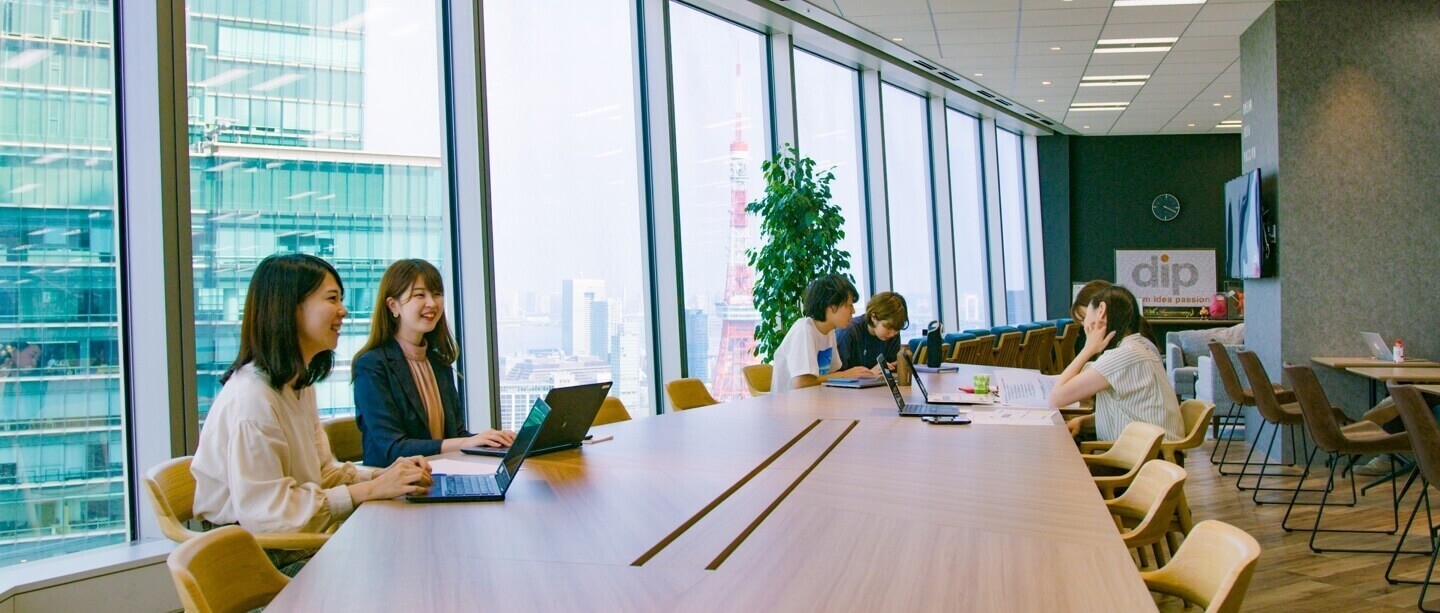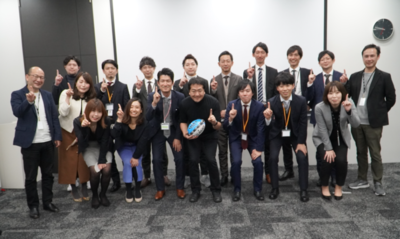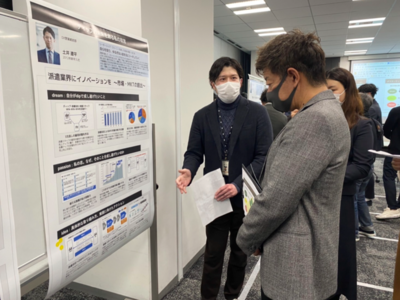
Promotion of Work Style Reforms and Diversity at Work
Promotion of DEI
Based on the belief that ‘people are everything and people are assets,’ dip has conducted employee training and enhanced the working environment with the aim of creating an environment that allows every employee, each with their own diverse individuality, to demonstrate their abilities to the full, thus increasing their sense of happiness.
In order to further strengthen these efforts, we formulated the Human Resource Development Policy and the Policy to Enhance the Working Environment.


1. Personnel system to support a flexible working style
dip adopts a human resource management system that aims to achieve work-life balance and create a workplace where employees with diverse backgrounds are able to demonstrate their individual capabilities to the fullest.
■Annual paid holiday system
In order to create an environment in which employees can maintain a sound mental and physical health and work, annual paid leave is granted immediately after employment.
*Statutory rules state that leave is granted six months after joining the company.
*Eligibility:*Only full-time employees
■ Reserve paid leave system
This system was newly established in March 2025 with the aim of creating a safe and secure working environment by establishing a system to support the balance between work and home life.
This is a system separate from existing paid leave that allows employees to accumulate paid leave that will expire after two years of unused leave from the date of grant and use it for childcare, nursing care, long-term hospitalisation or treatment of sudden illness requiring medical treatment or therapy. (Maximum number of days held: 20)
*Eligibility: all employees (including fixed-term employees)
■Flexible working system (Introduced in April 2015)
This system allows employees to choose from the working styles indicated below in a flexible manner, depending on individual needs that may arise in relation to marriage, childbirth, or nursing care for elderly family members.
・No overtime work
・Shorter work week (minimum of three days/week)
・Shorter working hours (can be shortened in 30 minute increments, from one hour to four hours per day)
・Changes to opening/closing hours
■Teleworking system (as-needed)
Although dip has a policy that requires employees to come to work, we have introduced teleworking system on an as-needed basis for highly productive work or based on various circumstances.
Work and performance targets for the day of implementation are applied for in advance, and telework may be used if approved. We will continue to update the system to seek growth as an organization while increasing productivity.
*For some highly specialized positions (engineers, etc.), we have a rule that everyone must come to work on the same day and work in the office at least 3 days per week.
■Flextime system (Introduced in 2016)
The flexible working time system involves the core office hours (11.00 a.m. – 3.00 p.m.) of the day during which employees are required to be at work, and noncore hours during which employees have flexibility in terms of altering the time they start work or leave the office.
*In principle, employees in grade S2 and above are eligible. In cases of special circumstances such as childcare or nursing care, the program may be applied to employees below S2.
■Anniversary Leave/Family Leave (Introduced in April 2016)
dip grants two additional days of annual paid leave for employees’ special anniversaries or family events, with the aim of helping them pursue quality of life with comfort and a sense of stability in their private or family lives.
■Annual leave by the hour (Introduced in March 2018)
dip now grants annual paid leave by the hour, with the aim of providing flexibility in working hours. Previously, annual paid leave was granted only in whole or half days.
■Casual dress code (Introduced in March 2019)
dip has adopted a dress code that allows employees to choose casual attire for work. This is an opportunity for employees to feel comfortable and display their individuality at work.
| Unit | FY'21/2 | FY'22/2 | FY'23/2 | FY'24/2 | FY'25/2 | |
|---|---|---|---|---|---|---|
| Percentage of annual paid holidays taken | % | 44.9 | 56.6 | 59.4 | 72.5 | 80.7 |
| Extra hours worked (hours/month) | hours | 24.1 | 25.4 | 23 | 19.8 | 18.1 |
*For past data, please refer to the Integrated Report.
*Subject to change for reasons such as a review of the scope of aggregation and aggregation items.
2. Holidays/leave programs supporting a balance between childcare and work
dip offers a comfortable workplace for female employees following their maternity leave by providing support to those with parenting responsibilities.
■Childcare leave program
As a general rule, employees are eligible to use this system until their child reaches the age of one. Under certain circumstances (no vacancy at childcare facilities), this may be extended until the child reaches the age of two. At dip, nearly 100% of employees come back to work after taking maternity leave. In July 2022, dip endorsed the "100% Paternity Leave Declaration" promoted by Work-Life Balance Co. ,Ltd., and strives to create an environment in which it is easy to take childcare leave. Such efforts include promoting diverse working styles for men and allowing men to take childcare leave even if they have been employed for less than one year.
■Spousal maternity leave program
Up to seven days of leave may be taken at any time during the 30 days before and after the expected date of birth.
■Reduced working hours for childcare
Although the statutory requirement is relevant only for workers raising children under three years of age, dip allows employees to use this system up to End of the sixth grade of elementary school, going far beyond the legal requirements.
■Childcare leave program
Up to ten days of childcare leave are granted in case of the unexpected illness of a child or doctor’s appointments for a medical check-up or vaccination. At dip, the first five days taken are treated as paid holidays, with the salary paid as usual. Employees remain eligible to use this system until their children have completed the third grade of elementary school.
■Subsidized childcare
This is a discount system for employees who are unable to enroll their child in a daycare center or cannot leave their child at a daycare center due to early morning or night duties.
| Unit | FY'21/2 | FY'22/2 | FY'23/2 | FY'24/2 | FY'25/2 | |
|---|---|---|---|---|---|---|
| Percentage of women who take childcare leave | % | 100 | 100 | 98.2 | 100 | 100 |
| Percentage of women returning to work | % | 84.8 | 97 | 100 | 98 | 100 |
| Percentage of men who take childcare leave | % | 64.3 | 61.1 | 92.5 | 100 | 100 |
*For past data, please refer to the Integrated Report.
*Subject to change for reasons such as a review of the scope of aggregation and aggregation items.
*Regarding the percentage of men who take childcare leave, based on the Act on Childcare Leave, Caregiver Leave, and Other Measures for the Welfare of Workers Caring for Children or Other Family Members, the percentage of employees taking childcare leave, etc. and leave for childcare purposes as stipulated in Article 71-6, Item 2 of the Ordinance for Enforcement of the Act on Childcare Leave, Caregiver Leave, and Other Measures for the Welfare of Workers Caring for Children or Other Family Members is calculated.
3. Initiatives supporting the empowerment of women
Sixty percent of dip's employees are in their 20s, and 90% are in their 30s or younger, of which half are women, and we believe that the active participation of women in our company is one of the keys to sustainable growth. By the fiscal year ending February 2025, we will be implementing various systems and initiatives to promote the active participation of women, with the aim of increasing the percentage of female managers who have joined our company as new graduates to 50% and the overall proportion of female managers to 40%.
In 2013, dip was certified by the Ministry of Health, Labour and Welfare as a Childcare Support Company and was permitted to use the Kurumin mark. In February 2017, dip was awarded Eruboshi status by the Ministry of Health, Labour and Welfare for its initiatives to promote the empowerment of women in the workforce. There are three classes of Eruboshi certification, and dip was awarded Class 3, which is the highest ranking.
■Management training with awareness of the Gender Gap
Since September 2020, we have conducted joint surveys and research with Akiko Kokubo, an assistant professor at the University of Shizuoka on promoting the active participation of women at the workplace. The results of the study revealed that self-affirmation is a factor that creates gender differences in motivation to seek promotion. Based on this research, we developed training for managers and are conducting management skill training with the goal of fostering self-esteem among female employees.
■Leadership Journey: Selective training for aspiring executives
We are conducting a selective training program called "Leadership Journey" with the aim of developing executives who will lead the next generation of dip. In order to ensure the development of future female executives, a number of female employees have been selected for participation in the program.
■Initiatives to address women's health issues
We believe that caring for women's unique health issues and supporting their health is extremely important to achieving sustainable growth, and we are actively working to create an environment where female employees can work with enthusiasm.
・Training on women's health issues
Our public health nurses are conducting online training for all employees on "Health Issues and Support for Working Women", which covers health issues specific to women and treatment methods that may affect career development for female employees. An online training seminar was held in June 2023 with the participation of 92.3% of all employees, and 96.8% responded in a post-viewing survey that they had a better understanding as a result of the training.
In conjunction with the introduction of the egg freezing program, a seminar was held for employees by a specialist physician to improve literacy regarding health differences between genders, and health, and to promote understanding of the benefits of egg freezing.
・Health examination
In addition to the regular checkup menu, cervical and breast cancer examinations are offered at the company's expense.
※For employees over the age of thirty, cervical cancer screening and breast cancer screening (breast ultrasound) are provided, and for those over forty, breast cancer screening (mammography) is provided at the company's expense.
・Establishment of consultation desk exclusively for women
We have established an environment where women can feel comfortable consulting with us on health issues specific to women.
・Egg freezing subsidy program
As one of the options to support female employees in balancing their careers and life plans, we have introduced a "Social Egg Freezing Cost Subsidy".
※Up to ¥400,000 subsidy for the cost of egg freezing for female employees up to age 39
※Social egg freezing is a method for preparing for future pregnancies for those who wish to have and raise children but are unable to do so immediately due to various circumstances.
Actual Results
| Unit | FY'21/2 | FY'22/2 | FY'23/2 | FY'24/2 | FY'25/2 | |
|---|---|---|---|---|---|---|
| Percentage of women * Including temporary and part time employees | % | 48.8 | 49.8 | 50.4 | 50.7 | 50.9 |
| Percentage of women among new graduate employees promoted to managerial positions | % | 40.6 | 41.3 | 43.5 | 45.2 | 43.6 |
| Percentage of female managers | % | 32.4 | 33.2 | 34.4 | 36.2 | 36.8 |
*For past data, please refer to the Integrated Report.
*Subject to change for reasons such as a review of the scope of aggregation and aggregation items.


4. Various systems related to nursing care
In response to the nursing care challenges that everyone faces due to the aging of the population and the decline in the working age population, we aim to create a work environment where people can continue to work and develop their careers while providing nursing care with peace of mind.
■Nursing care leave
Each eligible family member can take leave up to three times, for a total of 93 days.
■Nursing care leave (Leave granted in excess of statutory requirements)
This system allows employees to take up to 12 days of nursing care leave per year in addition to annual paid leave. If the caregiver is a parent, spouse or child, the leave can be used with pay and can be taken in increments of one hour. (In other cases, the leave can be used for 12 days per year without pay.)
※The law allows up to five days per year for one eligible family member, and up to 10 days per year for two or more eligible family members.
■Travel expenses related to care
In the following cases, we will provide travel expenses for one support visit per month.
One of the parents has been certified as requiring long-term care.
(Document of certification of need for long-term care is required)
The employee lives separately from his/her parents, and the employee returns home to care for them.
■Consultation for nursing care
A consultation service is available, staffed by personnel with knowledge of nursing care and social workers.
5. Initiatives to promote employment of people with disabilities / Employment of teleworkers with disabilities
We actively employ people with disabilities, including supporting remote employment for people with disabilities who have difficulty commuting to and from work. Employees with disabilities who work remotely are supported by dedicated employees who speak to them on a daily basis, manage their work progress, and provide consultation on their concerns as needed, in an effort to provide understanding and support and to make the workplace attractive and easy for people with disabilities. In addition, the "Campaign for Employment of People with Disabilities" conducted by the Japan Job Advertisement Association is endorsed by our job information sites Baitoru and Hatarako.net and we are conducting campaigns such as free posting of employment opportunities for people with disabilities.
We are promoting support for the employment of people with disabilities through our business.
Percentage of people with disabilities employed at dip
| Unit | FY'21/2 | FY'22/2 | FY'23/2 | FY'24/2 | FY'25/2 | |
|---|---|---|---|---|---|---|
| Percentage of people with disabilities employed | % | 1.7 | 2.6 | 3.0 | 2.2 | 2.7 |
*For past data, please refer to the Integrated Report.
*Subject to change for reasons such as a review of the scope of aggregation and aggregation items.
*As of June 1, 2024 at the time of reporting the status of employment of people with disabilities to the Ministry of Health, Labour and Welfare.
6. LGBTQ+ initiatives
We are promoting a variety of initiatives to create workplaces and environments where people with diverse personalities can recognize and cooperate with each other, and to promote DEI as an important measure of human capital management.
In the fiscal year ending February 2024, we introduced a partnership system to apply internal systems and welfare benefits equivalent to those of spouses (those who are legally married) to same-sex partners and common-law partners.
Affected internal systems
・Special leave (marriage leave, bereavement leave, leave related to the childbirth, childcare, or nursing care of a partner)
・Living away from home allowance
・Congratulatory and condolence benefits and use of welfare services
・Recognized beneficiary for group insurance, preparation fees and travel expenses for relocation (transfer) among others.
Additionally, in August 2023, we conducted online training for all employees to promote understanding of LGBTQ+ people and foster a corporate culture in which all parties feel at ease in their work. This training provides basic knowledge about LGBTQ+ issues and how to deal with discriminatory speech or behavior.
In September 2023, the Company invited an outside lecturer to conduct training for directors and executive officers on the topic of "Sexual / Gender Diversity in the Workplace" to gain expert knowledge on promoting DEI.
